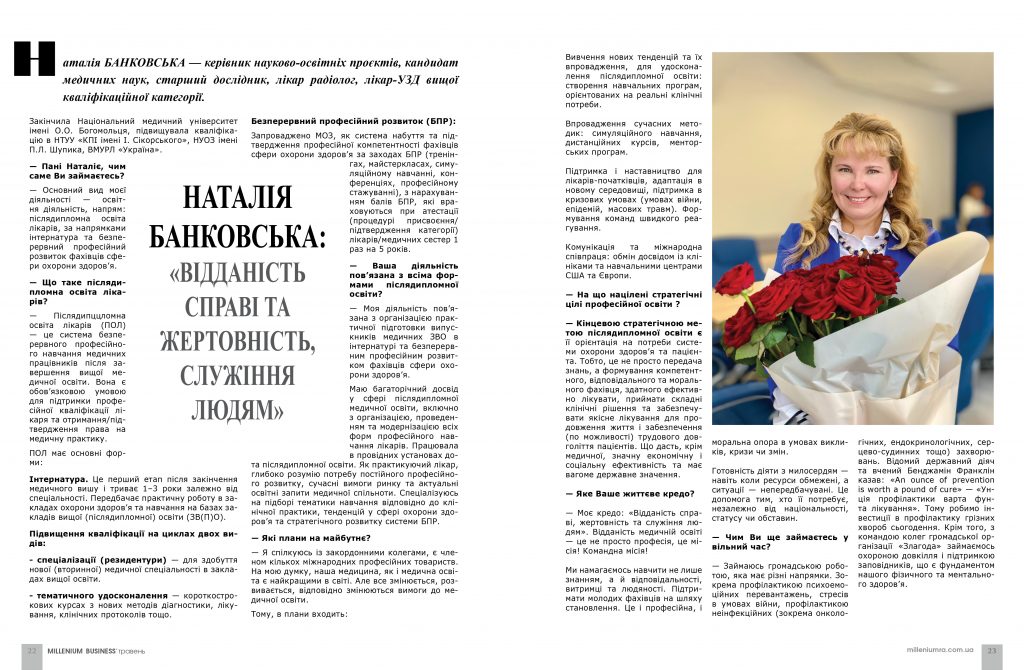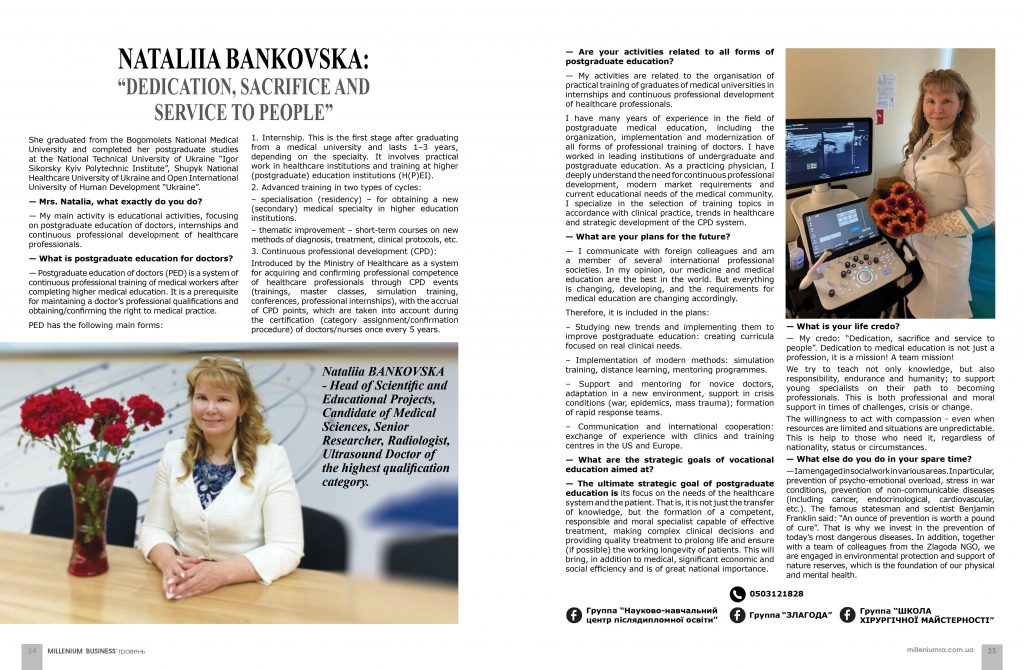Наталія БАНКОВСЬКА — керівник науково-освітніх проєктів, кандидат медичних наук, старший дослідник, лікар.радіолог, лікар-УЗД вищої кваліфікаційної категорії.

Закінчила Національний медичний університет імені О.О. Богомольця, підвищувала кваліфікацію в НТУУ «КПІ імені І. Сікорського», НУОЗ імені П.Л. Шупика, ВМУРЛ «Україна».
— Пані Наталіє, чим саме Ви займаєтесь?
— Основний вид моєї діяльності — освітня діяльність, напрям: післядипломна освіта лікарів, за напрямками інтернатура та безперервний професійний розвиток фахівців сфери охорони здоров’я.
— Що таке післядипломна освіта лікарів?
— Післядипломна освіта лікарів (ПОЛ) — це система безперервного професійного навчання медичних працівників після завершення вищої медичної освіти. Вона є обов’язковою умовою для підтримки професійної кваліфікації лікаря та отримання/підтвердження права на медичну практику.
ПОЛ має основні форми:
Інтернатура. Це перший етап після закінчення медичного вишу і триває 1–3 роки залежно від спеціальності. Передбачає практичну роботу в закладах охорони здоров’я та навчання на базах закладів вищої (післядипломної) освіти (ЗВ(П)О).
Підвищення кваліфікації на циклах двох видів:
- спеціалізації (резидентури) — для здобуття нової (вторинної) медичної спеціальності в закладах вищої освіти.
- тематичного удосконалення — короткострокових курсах з нових методів діагностики, лікування, клінічних протоколів тощо.
Безперервний професійний розвиток (БПР):
Запроваджено МОЗ, як система набуття та підтвердження професійної компетентності фахівців сфери охорони здоров’я за заходах БПР (тренінгах, майстеркласах, симуляційному навчанні, конференціях, професійному стажуванні), з нарахуванням балів БПР, які враховуються при атестації (процедурі присвоєння/підтвердження категорії) лікарів/медичних сестер 1 раз на 5 років.
— Ваша діяльність пов’язана з усіма формами післядипломної освіти?
— Моя діяльність пов’язана з організацією практичної підготовки випускників медичних ЗВО в інтернатурі та безперервним професійним розвитком фахівців сфери охорони здоров’я.
Маю багаторічний досвід у сфері післядипломної медичної освіти, включно з організацією, проведенням та модернізацією всіх форм професійного навчання лікарів. Працювала в провідних установах до- та післядипломної освіти. Як практикуючий лікар, глибоко розумію потребу постійного професійного розвитку, сучасні вимоги ринку та актуальні освітні запити медичної спільноти. Спеціалізуюся на підборі тематики навчання відповідно до клінічної практики, тенденцій у сфері охорони здоров’я та стратегічного розвитку системи БПР.
— Які плани на майбутнє?
— Я спілкуюся із закордонними колегами, є членом кількох міжнародних професійних товариств. На мою думку, наша медицина, як і медична освіта, є найкращими в світі. Але все змінюється, розвивається, відповідно змінюються вимоги до медичної освіти.
Тому, в плани входить:
Вивчення нових тенденцій та їх впровадження, для удосконалення післядипломної освіти: створення навчальних програм, орієнтованих на реальні клінічні потреби.
Впровадження сучасних методик: симуляційного навчання, дистанційних курсів, менторських програм.
Підтримка і наставництво для лікарів-початківців, адаптація в новому середовищі, підтримка в кризових умовах (умовах війни, епідемій, масових травм). Формування команд швидкого реагування.
Комунікація та міжнародна співпраця: обмін досвідом із клініками та навчальними центрами США та Європи.
— На що націлені стратегічні цілі професійної освіти ?
— Кінцевою стратегічною метою післядипломної освіти є її орієнтація на потреби системи охорони здоров’я та пацієнта. Тобто, це не просто передача знань, а формування компетентного, відповідального та морального фахівця, здатного ефективно лікувати, приймати складні клінічні рішення та забезпечувати якісне лікування для продовження життя і забезпечення (по можливості) трудового довголіття пацієнтів. Що дасть, крім медичної, значну економічну і соціальну ефективність та має вагоме державне значення.
— Яке Ваше життєве кредо?
— Моє кредо: «Відданість справі, жертовність та служіння людям». Відданість медичній освіті — це не просто професія, це місія! Командна місія!
Ми намагаємось навчити не лише знанням, а й відповідальності, витримці та людяності. Підтримати молодих фахівців на шляху становлення. Це і професійна, і моральна опора в умовах викликів, кризи чи змін.
Готовність діяти з милосердям — навіть коли ресурси обмежені, а ситуації — непередбачувані. Це допомога тим, хто її потребує, незалежно від національності, статусу чи обставин.
— Чим Ви ще займаєтесь у вільний час?
— Займаюсь громадською роботою, яка має різні напрямки. Зокрема профілактикою психоемоційних перевантажень, стресів в умовах війни, профілактикою неінфекційних (зокрема онкологічних, ендокринологічних, серцево-судинних тощо) захворювань. Відомий державний діяч та вчений Бенджамін Франклін казав: «An ounce of prevention is worth a pound of cure» — «Унція профілактики варта фунта лікування». Тому робимо інвестиції в профілактику грізних хвороб сьогодення. Крім того, з командою колег громадської організації «Злагода» займаємось охороною довкілля і підтримкою заповідників, що є фундаментом нашого фізичного та ментального здоров’я.

Nataliia BANKOVSKA: “Dedication, sacrifice and service to people”
Nataliia BANKOVSKA – Head of Scientific and Educational Projects, Candidate of Medical Sciences, Senior Researcher, Radiologist, Ultrasound Doctor of the highest qualification category.
She graduated from the Bogomolets National Medical University and completed her postgraduate studies at the National Technical University of Ukraine “Igor Sikorsky Kyiv Polytechnic Institute”, Shupyk National Healthcare University of Ukraine and Open International University of Human Development “Ukraine”.
— Mrs. Natalia, what exactly do you do?
— My main activity is educational activities, focusing on postgraduate education of doctors, internships and continuous professional development of healthcare professionals.
— What is postgraduate education for doctors?
— Postgraduate education of doctors (PED) is a system of continuous professional training of medical workers after completing higher medical education. It is a prerequisite for maintaining a doctor’s professional qualifications and obtaining/confirming the right to medical practice.
PED has the following main forms:
- Internship. This is the first stage after graduating from a medical university and lasts 1–3 years, depending on the specialty. It involves practical work in healthcare institutions and training at higher (postgraduate) education institutions (H(P)EI).
- Advanced training in two types of cycles:
– specialisation (residency) – for obtaining a new (secondary) medical specialty in higher education institutions.
– thematic improvement – short-term courses on new methods of diagnosis, treatment, clinical protocols, etc. - Continuous professional development (CPD):
Introduced by the Ministry of Healthcare as a system for acquiring and confirming professional competence of healthcare professionals through CPD events (trainings, master classes, simulation training, conferences, professional internships), with the accrual of CPD points, which are taken into account during the certification (category assignment/confirmation procedure) of doctors/nurses once every 5 years.
— Are your activities related to all forms of postgraduate education?
— My activities are related to the organisation of practical training of graduates of medical universities in internships and continuous professional development of healthcare professionals.
I have many years of experience in the field of postgraduate medical education, including the organization, implementation and modernization of all forms of professional training of doctors. I have worked in leading institutions of undergraduate and postgraduate education. As a practicing physician, I deeply understand the need for continuous professional development, modern market requirements and current educational needs of the medical community. I specialize in the selection of training topics in accordance with clinical practice, trends in healthcare and strategic development of the CPD system.
— What are your plans for the future?
— I communicate with foreign colleagues and am a member of several international professional societies. In my opinion, our medicine and medical education are the best in the world. But everything is changing, developing, and the requirements for medical education are changing accordingly.
Therefore, it is included in the plans:
– Studying new trends and implementing them to improve postgraduate education: creating curricula focused on real clinical needs.
– Implementation of modern methods: simulation training, distance learning, mentoring programmes.
– Support and mentoring for novice doctors, adaptation in a new environment, support in crisis conditions (war, epidemics, mass trauma); formation of rapid response teams.
– Communication and international cooperation: exchange of experience with clinics and training centres in the US and Europe.
— What are the strategic goals of vocational education aimed at?
— The ultimate strategic goal of postgraduate education is its focus on the needs of the healthcare system and the patient. That is, it is not just the transfer of knowledge, but the formation of a competent, responsible and moral specialist capable of effective treatment, making complex clinical decisions and providing quality treatment to prolong life and ensure (if possible) the working longevity of patients. This will bring, in addition to medical, significant economic and social efficiency and is of great national importance.
— What is your life credo?
— My credo: “Dedication, sacrifice and service to people”. Dedication to medical education is not just a profession, it is a mission! A team mission!
We try to teach not only knowledge, but also responsibility, endurance and humanity; to support young specialists on their path to becoming professionals. This is both professional and moral support in times of challenges, crisis or change.
The willingness to act with compassion – even when resources are limited and situations are unpredictable. This is help to those who need it, regardless of nationality, status or circumstances.
— What else do you do in your spare time?
— I am engaged in social work in various areas. In particular, prevention of psycho-emotional overload, stress in war conditions, prevention of non-communicable diseases (including cancer, endocrinological, cardiovascular, etc.). The famous statesman and scientist Benjamin Franklin said: “An ounce of prevention is worth a pound of cure”. That is why we invest in the prevention of today’s most dangerous diseases. In addition, together with a team of colleagues from the Zlagoda NGO, we are engaged in environmental protection and support of nature reserves, which is the foundation of our physical and mental health.
